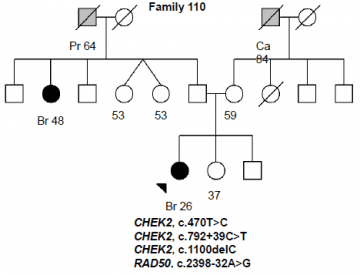Early onset BRCA1/2 negative breast cancer
Breast cancer (BC) is the most common cancer and the leading cause of cancer-related deaths in women in both developed and developing countries. Approximately 20–25% of familial BCs are due to germline variants in two high-risk genes, BRCA1 and BRCA2, which are tumour suppressor genes that encode large proteins that act in a common pathway of genome protection and have important roles at different stages in DNA damage response (DDR) and DNA repair. Variant in BRCA1/2 confer a high risk of breast and ovarian cancers; the average cumulative cancer risks in a population-based series of unselected breast or ovarian cancer patients have been estimated to be 65% and 39% for BRCA1 variant carriers and 45% and 11% for BRCA2 variant carriers, respectively, by age of 70.
In the Finnish population, the contribution of BRCA1/2 -variants to the breast/ovarian cancer families and ovarian cancer-only families is ~ 20% and 26%, respectively. In our previous studies, we’ve already shown mutations also in other than BRCA1/2 genes – for example CHEK2 and RAD50 – to play a significant role in BC predisposition.

Family pedigree of the indexindividual with the identified CHEK2 c.470T > C, c.792 + 39C > T,c.1100delC, and RAD50 c. 2398-32A > G variants. Individuals with breast cancer with age at diagnosis are marked with black circles. Other cancers are marked in grey and accompanied by age at diagnosis, if known. Index individual is marked with an arrow. Deceased individuals are indicated with a slash. Current ages of healthy females are marked if known. Br, breast cancer; Ca, cancerwith unknown primary site; Pr, prostate (Kuusisto et al. Breast Cancer Research 2011, 13:R20).
In the current project, a whole-genome-sequencing approach is used to identify additional rare variants that contribute to breast/ovarian cancer predisposition in Finnish BRCA1/2 -negative cases, many of which are very early-onset BC patients. The primary aim is to identify variants that target DDR pathway genes. The secondary aim is to identify novel candidate genes contributing to early-onset BC by exploring genes in any pathway, with a special focus on those that likely has a role in tumorigenesis such as pathways related to the cell cycle, DNA replication, signalling, DNA repair, and apoptosis.
In our additional projects we do targeted analyses for triple negative breast cancer cases and investigate the importance of neoadjuvant therapies. These studies are carried out in close collaboration with Dr. Minna Kankuri-Tammilehto (Department of Clinical Genetics, Turku Universtiy Hospital and Institute of Biomedicine, Univeresity of Turku) and Dr. Pauliina Kronqvist (Department of Pathology, Turku University Hospital and Institute of Biomedicine, University of Turku).